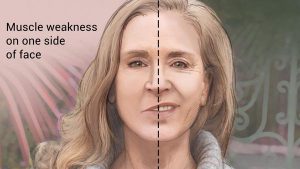
Bell’s Palsy is a disease in which the muscles on one side of your face become weak or paralyzed. It will affect only one side of your face at a time, making it too stiff or causing it to droop on the side with diseases.
It is caused by damage to the cranial nerve, which causes swelling.
Symptoms :
-
- Cold sores and genital herpes
- Chickenpox and shingles
- Infectious mononucleosis
- Cytomegalovirus infections
- Respiratory illnesses
- German measles
- Mumps
- Flu
- Hand-foot-and-mouth disease
- You’re unable to close your eyelid or blink
- Your eye waters more or less than usual
- Drooling
- Difficulty chewing
- Decreased sense of taste
- Your facial muscles twitch
- Pain or numbness behind your ear
- Pain around the jaw or in or behind your ear on the affected side
- Increased sensitivity to sound on the affected side
- Headache
- A decrease in your ability to taste
- Changes in the amount of tears and saliva you produce
Some people feel pain behind their ear 1-2 days before they notice any weakness. Others say that sounds seem much louder than normal in the days before they see any other symptoms.
In rare cases, Bell’s Palsy can affect both sides of your face.
Most people start to feel better within a couple of weeks. They usually recover completely within 3 months. Some people who develop Bell’s palsy have a longer recovery period. In rare cases, they may have some permanent symptoms.
Risk Factors :
- people having diabetes
- who are recovering from a viral infection.
- Are pregnant, especially during the third trimester, or who are in the first week after giving birth
- Have an upper respiratory infection, such as the flu or a cold
– In some of these cases, there’s a family history of recurrent attacks — suggesting a possible genetic predisposition to Bell’s palsy.
Complications :
A person with Bell’s Palsy normally recovers within a month. Recovering from a severe case might cause total paralysis too. Some complications may include :
- Irreversible damage to your facial nerve
- Abnormal regrowth of nerve fibers, resulting in involuntary contraction of certain muscles when you’re trying to move others (synkinesis) — for example, when you smile, the eye on the affected side may close
- Partial or complete blindness of the eye that won’t close due to excessive dryness and scratching of the clear protective covering of the eye
Diagnosis :
There’s no specific test for Bell’s palsy. Your doctor will look at your face and ask you to move your facial muscles by closing your eyes, lifting your brow, showing your teeth and frowning, among other movements.
Other conditions — such as a stroke, infections, Lyme disease, and tumors — can also cause facial muscle weakness, mimicking Bell’s palsy. If the cause of your symptoms isn’t clear, your doctor may recommend other tests, including:
- Electromyography (EMG). This test can confirm the presence of nerve damage and determine its severity. An EMG measures the electrical activity of a muscle in response to stimulation and the nature and speed of the conduction of electrical impulses along a nerve.
- Imaging scans. Magnetic resonance imaging (MRI) or computerized tomography (CT) may be needed on occasion to rule out other possible sources of pressure on the facial nerve, such as a tumor or skull fracture.
Treatments :
Most people with Bell’s palsy recover fully; with or without treatment. There’s not only 1 treatment for Bell’s palsy, but your doctor may suggest medications or physical therapy to help speed your recovery. Surgery is rarely an option for Bell’s Palsy.
Medications :
Commonly used medications to treat Bell’s palsy include:
- Corticosteroids, such as prednisone, are powerful anti-inflammatory agents. If they can reduce the swelling of the facial nerve, it will fit more comfortably within the bony corridor that surrounds it. Corticosteroids may work best if they’re started within several days of when your symptoms started.
- Antiviral drugs. The role of antivirals remains unsettled. Antivirals alone have shown no benefit compared with placebo. Antivirals added to steroids are possibly beneficial for some people with Bell’s palsy, but this is still unproved.
- However, despite this, valacyclovir (Valtrex) is sometimes given in combination with prednisone in people with severe facial palsy.
Implications :
- Economic – If a poor person has Bell’s Palsy then it would be very difficult for him/her to get treatment for himself/herself
- Geographical – If the country is a developed country then it would be easy for the people to get treatment but if it will be an underdeveloped country then it would be really tough to get treatment
- Cultural – there are some religions that don’t allow surgeries and transplants.
There is no transplantation needed for this disease.